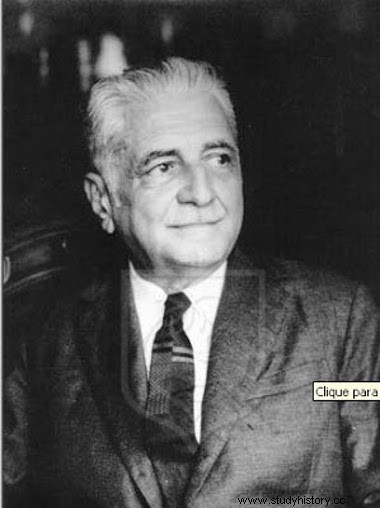
By Me. Cláudio Fernandes
The Brazilian republican experience, as is well known, lived through several troubled periods marked by authoritarian bias. At its beginning, which became known as “Republic da Sword ”, the republic was governed by two marshals, who participated in its institutionalization process. With the Revolution from 1930 and the rise of Getúlio Vargas to power, it did not take long for the political regime to turn once again to authoritarianism with the support of the armed forces. The State New, which ended in 1945, profoundly marked a generation of Brazilian intellectuals (a generation that was also marked by the Monday War World ).
The Brazilian anthropologist Gilberto Freyre (1900-1987) was among the best of these intellectuals. In 1948, already in the phase of Brazilian democratic restoration, Freyre held a conference at the Army General Staff School, at the invitation of General Tristão de Alencar Araripe, on November 30, with the aim of weaving reflections on the relationship between the Nation and the Army in Brazil. These reflections should account for a phenomenon that, according to Freyre, afflicted Brazilian institutions as a whole, namely:the reliability of civilian activities to the administration of the military.
At the conference, Freyre highlighted that the main symptom of a “socially ill people” was the fact that these people dispensed with administrative, corporate, moral, ideological activities, etc., and delegate them all to the institution of the Armed Forces, as if everything that guaranteed social order was the exclusive role of the latter. Freyre defended a thesis that he considered extremely important:for any society (and especially Brazilian society) to strengthen and become mature, it must mirror itself in the institution of the army and in its characteristics to better articulate and command the army. country; and not to delegate all responsibility to the Armed Forces.
The army with its hierarchical organization, its capacity for moral and disciplinary ordering and its administrative efficiency is, for Freyre, the best model on which civil society can be inspired. If a nation is disorganized, it is necessary for it to reorganize itself, taking as a parameter a disciplinary institution such as the army. Freyre's criticism is expressed in the following terms:
“The truth, however, is that the country where the Army is the only, or almost the only, organized force, needs urgent organization or reorganization of the set of its social activities and culture to truly be a nation. A disorganized nation is not a nation:it is just a landscape. Nation landscape or scenery. And even if the army is morally and technically exquisite, if it is the only organized force in the nation, this nation is in danger of becoming a simple scene of parades or simple fields of maneuver, however athletic it may seem.” (FREYRE, Gilberto. Nation and Army . Rio de Janeiro:Livraria José Olympio, 1949. p. 30-31)
For Freyre, this understanding of the Nation inspired by the organization of the Army and not delivered to him or exempt from his own responsibilities became urgent. For him, […] “the solution that imposes itself is to try to imitate the example of the army in areas of civil activity, organizing as well as it can continue to be the coordinator in times of more acute maladjustment between regions or between national subgroups. .” (FREYRE, Gilberto. Nation and Army . Rio de Janeiro:Livraria José Olympio, 1949. p. 34)
* Image credits:Fundação Gilberto Freyre
